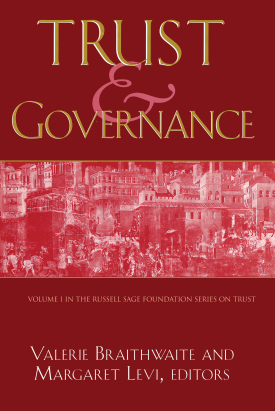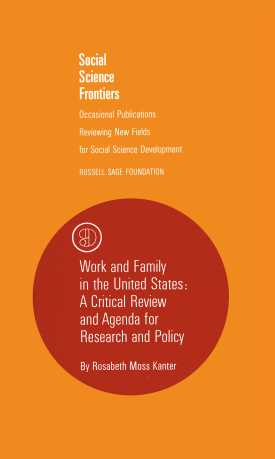
Work and Family in the United States
About This Book
Now considered a classic in the field, this book first called attention to what Kanter has referred to as the "myth of separate worlds." Rosabeth Moss Kanter was one of the first to argue that the assumes separation between work and family was a myth and that research must explore the linkages between these two roles.
ROSABETH MOSS KANTER holds the Ernest L. Arbuckle Professorship at Harvard Business School, where she specializes in strategy, innovation, and leadership for change.
Download
RSF Journal
View Book Series
Sign Up For Our Mailing List
Apply For Funding
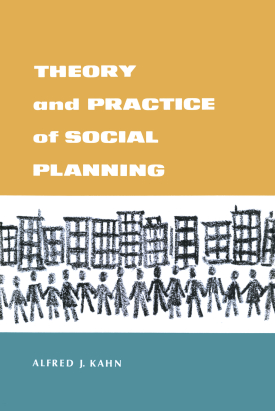
Theory and Practice of Social Planning
About This Book
Discusses the intellectual processes involved in social planning. Professor Kahn provides critical tools for the analysis of the planning process, and shows what social planning is and can be. Clarifying the major phases in the planning process, he shows how planning can succeed or fail at any one of these stages. He examined planners in their various roles: as "neutral" technicians and as advocates, as representatives of interest groups and as public officials.
The book describes both the social aspects of planning and the relationship between social and physical plans.
ALFRED J. KAHN was professor of Social Policy and Planning at the Columbia University School of Social Work.
Download
RSF Journal
View Book Series
Sign Up For Our Mailing List
Apply For Funding
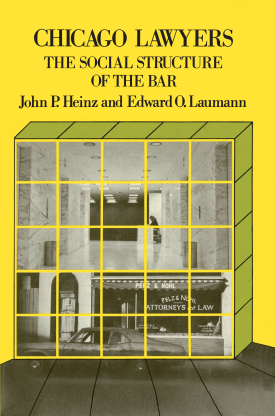
Chicago Lawyers
About This Book
What determines the systematic allocation of status, power, and economic reward among lawyers? What kind of social structure organizes lawyers’ roles in the bar and in the larger community?
As Heinz and Laumann convincingly demonstrate, the legal profession is stratified primarily by the character of the clients served, not by the type of legal service rendered. In fact, the distinction between corporate and individual clients divides the bar into two remarkably separate hemispheres. Using data from extensive personal interviews with nearly 800 Chicago lawyers, the authors show that lawyers who serve one type of client seldom serve the other. Furthermore, lawyers’ political, ethno-religious, and social ties are very likely to correspond to those of their client types. Greater deference is consistently shown to corporate lawyers, who seem to acquire power by association with their powerful clients.
Heinz and Laumann also discover that these two “hemispheres” of the legal profession are not effectively integrated by intraprofessional organizations such as the bar, courts, or law schools. The fact that the bar is structured primarily along extraprofessional lines raises intriguing questions about the law and the nature of professionalism, questions addressed in a provocative and far-ranging final chapter.
This volume, published jointly with the American Bar Foundation, offers a uniquely sophisticated and comprehensive analysis of lawyers’ professional lives. It will be of exceptional importance to sociologists and others interested in the legal profession, in the general study of professions, and in social stratification and the distribution of power.
JOHN P. HEINZ is Professor of law and Urban Affairs at Northwestern University and Executive Director of the American Bar Foundation.
Download
RSF Journal
View Book Series
Sign Up For Our Mailing List
Apply For Funding
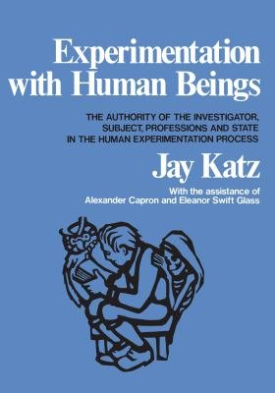
Experimentation with Human Beings
About This Book
In recent years, increasing concern has been voiced about the nature and extent of human experimentation and its impact on the investigator, subject, science, and society. This casebook represents the first attempt to provide comprehensive materials for studying the human experimentation process.
Through case studies from medicine, biology, psychology, sociology, and law—as well as evaluative materials from many other disciplines—Dr. Katz examines the problems raised by human experimentation from the vantage points of each of its major participants—investigator, subject, professions, and state. He analyzes what kinds of authority should be delegated to these participants in the formulation, administration, and review of the human experimentation process. Alternative proposals, from allowing investigators a completely free hand to imposing centralized governmental control, are examined from both theoretical and practical perspectives.
The conceptual framework of Experimentation with Human Beings is designed to facilitate not only the analysis of such concepts as “harm,” “benefit,” and “informed consent,” but also the exploration of the problems raised by man’s quest for knowledge and mastery, his willingness to risk human life, and his readiness to delegate authority to professionals and rely on their judgment.
JAY KATZ is the Elizabeth K. Dollard Professor Emeritus of Law, Medicine, and Psychoanalysis at the Yale Law School.
RSF Journal
View Book Series
Sign Up For Our Mailing List
Apply For Funding

Surveying Subjective Phenomena, Volume 1
About This Book
In January 1980 a panel of distinguished social scientists and statisticians assembled at the National Academy of Sciences to begin a thorough review of the uses, reliability, and validity of surveys purporting to measure such subjective phenomena as attitudes, opinions, beliefs, and preferences. This review was prompted not only by the widespread use of survey results in both academic and non-academic settings, but also by a proliferation of apparent discrepancies in allegedly equivalent measurements and by growing public concern over the value of such measurements.
This two-volume report of the panel’s findings is certain to become one of the standard works in the field of survey measurement. Volume I summarizes the state of the art of surveying subjective phenomena, evaluates contemporary measurement programs, examines the uses and abuses of such surveys, and candidly assesses the problems affecting them. The panel also offers strategies for improving the quality and usefulness of subjective survey data. In volume II, individual panel members and other experts explore in greater depth particular theoretical and empirical topics relevant to the panel’s conclusions.
For social scientists and policymakers who conduct, analyze, and rely on surveys of the national state of mind, this comprehensive and current review will be an invaluable resource.
CHARLES F. TURNER is professor of Applied Social Research at the City University of New York.
ELIZABETH MARTIN is research associate at the National Research Council.
CONTRIBUTORS: Robert P. Abelson, Barbara A. Bailar, Marian Ballard, Theresa J. Demaio, Otis Dudley Duncan, Baruch Fischhoff, Lester R. Frankel, William H. Kruskal, Michael B. Mackuen, Catherine Marsch, Elizabeth Martin, Sara B. Nerlove, Howard Schuman, Tom W. Smith, Charles F. Turner
Download
RSF Journal
View Book Series
Sign Up For Our Mailing List
Apply For Funding

The Color Bind
About This Book
“Erica Foldy and Tamara Buckley offer us an extraordinary book designed to explore what is, and push the conversation about race and organizational life forward. The Color Bind is a strong synthesis of theory, research, and analytic reflections on organizational practice. Their ‘case’ is a provocative example of an institution under enormous pressure to ‘not screw up’ made particularly salient in times of high surveillance, risk analyses, and social anxiety—precisely the conditions under which racial stereotypes flare and are circulated in the popular unconscious.”
—MICHELLE FINE, Distinguished Professor of Psychology, CUNY Graduate Center
“The Color Bind will help people in organizations and institutions break the unbearable silence about race and culture. It tackles the basic belief that silence about race makes it less present, but, as the authors eloquently argue, we end up in a color bind. The growth experience of the teams in this book illustrates how, with courage, we can build understanding and trust across race and culture.”
—STELLA NKOMO, professor of human resource management, University of Pretoria
Since the 1960s, the dominant model for fostering diversity and inclusion in the United States has been the “color blind” approach, which emphasizes similarity and assimilation and insists that people should be understood as individuals, not as members of racial or cultural groups. This approach is especially prevalent in the workplace, where discussions about race and ethnicity are considered taboo. Yet, as widespread as “color blindness” has become, many studies show that the practice has damaging repercussions, including reinforcing the existing racial hierarchy by ignoring the significance of racism and discrimination. In The Color Bind, workplace experts Erica Foldy and Tamara Buckley investigate race relations in office settings, looking at how both color blindness and what they call “color cognizance” have profound effects on the ways coworkers think and interact with each other.
Based on an intensive two-and-a-half-year study of employees at a child welfare agency, The Color Bind shows how color cognizance—the practice of recognizing the profound impact of race and ethnicity on life experiences while affirming the importance of racial diversity—can help workers move beyond silence on the issue of race toward more inclusive workplace practices. Drawing from existing psychological and sociological research that demonstrates the success of color-cognizant approaches in dyads, workgroups and organizations, Foldy and Buckley analyzed the behavior of work teams within a child protection agency. The behaviors of three teams in particular reveal the factors that enable color cognizance to flourish. While two of the teams largely avoided explicitly discussing race, one group, “Team North,” openly talked about race and ethnicity in team meetings. By acknowledging these differences when discussing how to work with their clients and with each other, the members of Team North were able to dig into challenges related to race and culture instead of avoiding them. The key to achieving color cognizance within the group was twofold: It required both the presence of at least a few members who were already color cognizant, as well as an environment in which all team members felt relatively safe and behaved in ways that strengthened learning, including productively resolving conflict and reflecting on their practice.
The Color Bind provides a useful lens for policy makers, researchers and practitioners pursuing in a wide variety of goals, from addressing racial disparities in health and education to creating diverse and inclusive organizations to providing culturally competent services to clients and customers. By foregrounding open conversations about race and ethnicity, Foldy and Buckley show that institutions can transcend the color bind in order to better acknowledge and reflect the diverse populations they serve.
ERICA GABRIELLE FOLDY is associate professor of public and nonprofit management at New York University.
TAMARA R. BUCKLEY is associate professor of counseling at Hunter College and psychology at The Graduate Center, City University of New York.
RSF Journal
View Book Series
Sign Up For Our Mailing List
Apply For Funding
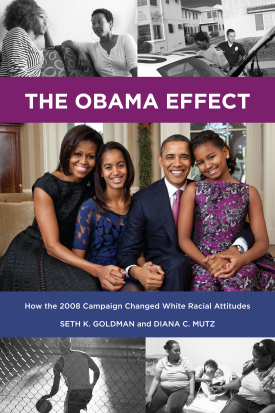
The Obama Effect
About This Book
Winner of the 2014 Frank Luther Mott-Kappa Tau Alpha Research Award
“Based on a unique sequence of national surveys tracking the 2008 presidential election, The Obama Effect is a breakthrough study. Vividly written, it simultaneously demonstrates the resilience of racial prejudice and the reality of racial progress.”
—PAUL SNIDERMAN, Fairleigh S. Dickinson Jr. Professor of Public Policy and senior fellow, Hoover Institution and the Freeman Spogli Institute for International Studies, Stanford University
“Seth Goldman and Diana Mutz’s rigorous demonstration of the positive Obama effect gives us reason for optimism that racial attitudes, although difficult to change, are nonetheless susceptible to conventional political communications and campaigns. This fine book also validates efforts to combat stereotypical portrayals in the media by showing the power of exemplary images and role models to influence how people think about race in this country.”
—DENNIS CHONG, chair and professor of political science, University of Southern California
Barack Obama’s historic 2008 campaign exposed many white Americans more than ever before to a black individual who defied negative stereotypes. While Obama’s politics divided voters, Americans uniformly perceived Obama as highly successful, intelligent, and charismatic. What effect, if any, did the innumerable images of Obama and his family have on racial attitudes among whites? In The Obama Effect, Seth K. Goldman and Diana C. Mutz uncover persuasive evidence that white racial prejudice toward blacks significantly declined during the Obama campaign. Their innovative research rigorously examines how racial attitudes form, and whether they can be changed for the better.
The Obama Effect draws from a survey of 20,000 people, whom the authors interviewed up to five times over the course of a year. This panel survey sets the volume apart from most research on racial attitudes. From the summer of 2008 through Obama’s inauguration in 2009, there was a gradual but clear trend toward lower levels of white prejudice against blacks. Goldman and Mutz argue that these changes occurred largely without people’s conscious awareness. Instead, as Obama became increasingly prominent in the media, he emerged as an “exemplar” that countered negative stereotypes in the minds of white Americans. Unfortunately, this change in attitudes did not last. By 2010, racial prejudice among whites had largely returned to pre-2008 levels. Mutz and Goldman argue that news coverage of Obama declined substantially after his election, allowing other, more negative images of African Americans to re-emerge in the media. The Obama Effect arrives at two key conclusions: Racial attitudes can change even within relatively short periods of time, and how African Americans are portrayed in the mass media affects how they change.
While Obama’s election did not usher in a “post-racial America,” The Obama Effect provides hopeful evidence that racial attitudes can—and, for a time, did—improve during Obama’s campaign. Engaging and thorough, this volume offers a new understanding of the relationship between the mass media and racial attitudes in America.
SETH K. GOLDMAN is Honors Assistant Professor of Communication at the University of Massachusetts, Amherst.
DIANA C. MUTZ is Samuel A. Stouffer Professor of Political Science and Communication at the University of Pennsylvania.
RSF Journal
View Book Series
Sign Up For Our Mailing List
Apply For Funding
About This Book
An effective democratic society depends on the confidence citizens place in their government. Payment of taxes, acceptance of legislative and judicial decisions, compliance with social service programs, and support of military objectives are but some examples of the need for public cooperation with state demands. At the same time, voters expect their officials to behave ethically and responsibly. To those seeking to understand—and to improve—this mutual responsiveness, Trust and Governance provides a wide-ranging inquiry into the role of trust in civic life.
Trust and Governance asks several important questions: Is trust really essential to good governance, or are strong laws more important? What leads people either to trust or to distrust government, and what makes officials decide to be trustworthy? Can too much trust render the public vulnerable to government corruption, and if so what safeguards are necessary? In approaching these questions, the contributors draw upon an abundance of historical and current resources to offer a variety of perspectives on the role of trust in government. For some, trust between citizens and government is a rational compact based on a fair exchange of information and the public's ability to evaluate government performance. Levi and Daunton each examine how the establishment of clear goals and accountability procedures within government agencies facilitates greater public commitment, evidence that a strong government can itself be a source of trust. Conversely, Jennings and Peel offer two cases in which loss of citizen confidence resulted from the administration of seemingly unresponsive, punitive social service programs.
Other contributors to Trust and Governance view trust as a social bonding, wherein the public's emotional investment in government becomes more important than their ability to measure its performance. The sense of being trusted by voters can itself be a powerful incentive for elected officials to behave ethically, as Blackburn, Brennan, and Pettit each demonstrate. Other authors explore how a sense of communal identity and shared values make citizens more likely to eschew their own self-interest and favor the government as a source of collective good. Underlying many of these essays is the assumption that regulatory institutions are necessary to protect citizens from the worst effects of misplaced trust. Trust and Governance offers evidence that the jurisdictional level at which people and government interact—be it federal, state, or local—is fundamental to whether trust is rationally or socially based. Although social trust is more prevalent at the local level, both forms of trust may be essential to a healthy society.
Enriched by perspectives from political science, sociology, psychology, economics, history, and philosophy, Trust and Governance opens a new dialogue on the role of trust in the vital relationship between citizenry and government.
VALERIE BRAITHWAITE is associate director of the Research School of Social Sciences at the Australian National University, Canberra, Australia. She is also coordinator of the Trust Strand of the Reshaping Australian Institutions Project in the Research School of Social Sciences.
MARGARET LEVI is professor of political science and Harry Bridges Chair in Labor Studies, University of Washington, Seattle. She is also director of the University of Washington Center for Labor Studies.
A Volume in the Russell Sage Foundation's Series on Trust
RSF Journal
View Book Series
Sign Up For Our Mailing List
Apply For Funding
Psychologists Mary Levitt and Jerome Levitt have conducted a multi-year study of academic, social, and emotional adaptation in newly immigrant children and adolescents. Project SOL (Students from Other Lands) is unique in addressing adaptation in elementary, middle, and high school students from five culturally-distinct areas, Argentina, Colombia, Cuba, Haiti, and the English-speaking West Indies, who had lived in the U.S. for less than a year at the beginning of the study. Students were interviewed and their parents were surveyed yearly over a three-year period.
Pagination
- Previous page
- Page 25
- Next page

